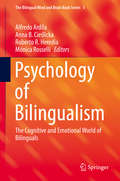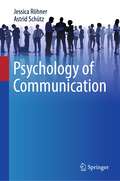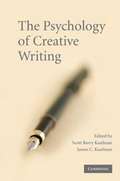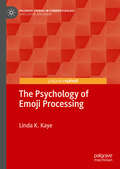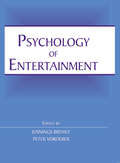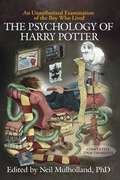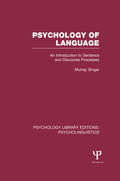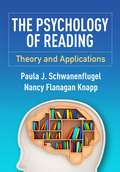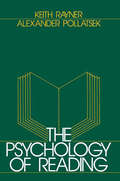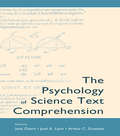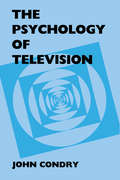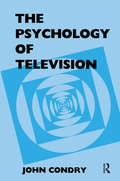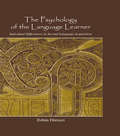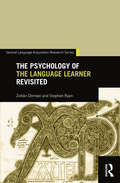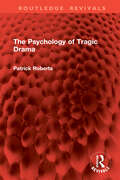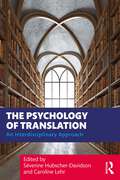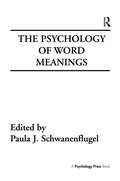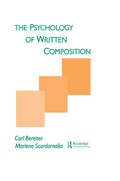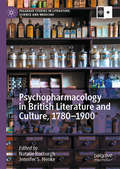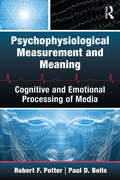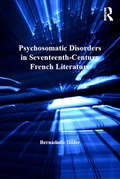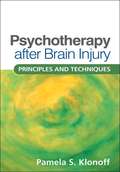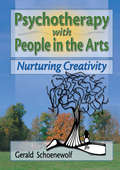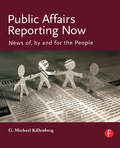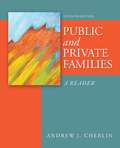- Table View
- List View
Psychology of Bilingualism
by Roberto R. Heredia Anna B. Cieślicka Alfredo Ardila Mónica RoselliThe aim of this volume is to integrate the current literature about the psychological dimensions of bilingualism: that is, to analyze psychological, subjective, and internal perspectives on bilingualism. What is the internal world of bilinguals like? How do they perceive the world and how do they think? What are the advantages and disadvantages of being bilingual? How does bilingualism interact with personality? In what way does being bilingual impact the aging mind? Renowned and emerging scholars alike explore these questions in the collected chapters. The organization of the book features four main component parts: (1) the inner cognitive world of the bilingual mind (2) bilingual language representation, and (3) bilingualism across the lifespan, and 4) bilingual cognitive and personality dimensions. Taken collectively, the included chapters provide a multidimensional and up-to-date perspective on bilingual studies, specifically concentrating on the cognitive and emotional dimensions of the individual. Chapter topics include: Conceptual Metaphor Theory Bilingual Figurative Language Processing Aging in Bilinguals Psychopathology in Bilinguals Personality Traits in Bilinguals Addressing the growing demand for bilingual research, this collection provides a timely and much needed perspective on the bilingual as an individual, exploring his/her internal world and a range of phenomena, including emotional word processing, personality traits, language effects on the mind, and cognitive effects of bilingualism. As such, it will appeal to a wide range of readers across various intellectual and professional arenas, including cognitive psychologists, personality psychologists, psycholinguists, educational psychologists and second language teachers, among others.
Psychology of Communication
by Jessica Röhner Astrid SchützThis successful textbook on the psychology of communication explains - here in English for the first time - how human communication works in a very understandable way. It begins with the explanation of central terms and the explanation of known communication models (e.g. the models according to Schulz von Thun, Watzlawick, Hargie and colleagues), then describes means of non-verbal and verbal communication and ends with a clear and structured summary of communication forms. Concrete fields of application, stumbling blocks (e.g. intercultural differences in communication), practical examples and digressions in the book round off what has been read and consolidate what has been learned. In addition, free learning materials are available on the Internet with which readers can test their knowledge acquisition.
The Psychology of Creative Writing
by Scott Barry Kaufman James C. KaufmanThe Psychology of Creative Writing takes a scholarly, psychological look at multiple aspects of creative writing, including the creative writer as a person, the text itself, the creative process, the writer's development, the link between creative writing and mental illness, the personality traits of comedy and screen writers, and how to teach creative writing. This book will appeal to psychologists interested in creativity, writers who want to understand more about the magic behind their talents, and educated laypeople who enjoy reading, writing, or both. From scholars to bloggers to artists, The Psychology of Creative Writing has something for everyone.
The Psychology of Emoji Processing (Palgrave Studies in Cyberpsychology)
by Linda K. KayeThis book draws together the scientific research on how we process and interpret emoji. Most books on the subject of emoji explain how we use emoji and the functions they serve for the sender, but very do very little to address the receiver’s perspective. Seeking to redress this, this book extracts insights from a range of psychology sub-disciplines to provide a comprehensive review of current research on how we process emoji. The book also includes recommended theoretical frameworks and methodologies to help researchers in this area to strengthen their research, as a way of helping advance the research field on this fascinating topic.
Psychology of Entertainment: The Psychology Of Its Appeal (Routledge Communication Series)
by Jennings Bryant Peter VordererAs entertainment becomes a trillion-dollar-a-year industry worldwide, as our modern era increasingly lives up to its label of the "entertainment age," and as economists begin to recognize that entertainment has become the driving force of the new world economy, it is safe to say that scholars are beginning to take entertainment seriously. The scholarly spin on entertainment has been manifested in traditional ways, as well as innovative ones. Representing the current state of theory and research, Psychology of Entertainment promises to be the most comprehensive and up-to-date volume on entertainment. It serves to define the new area of study and provides a theoretical spin for future work in the area.Divided into three basic parts, this book:*addresses the fundamental mechanisms and processes involved in orienting to and selecting entertainment fare, as well as receiving and processing it;*explores the mechanisms and processes by which we are entertained by the media messages we select and receive; and*provides an opportunity for the application of well-established as well as emerging psychological and psychobiological theories to be applied to the study of entertainment in ways that seldom have been utilized previously.Psychology of Entertainment will appeal to scholars, researchers, and graduate students in media studies and mass communication, psychology, marketing, and other areas contributing to the entertainment studies area.
The Psychology of Harry Potter: An Unauthorized Examination Of The Boy Who Lived
by Neil MulhollandHarry Potter has provided a portal to the wizarding world for millions of readers, but an examination of Harry, his friends and his enemies will take us on yet another journey: through the psyche of the Muggle (and wizard!) mind. The twists and turns of the series, as well as the psychological depth and complexity of J. K. Rowling&’s characters, have kept fans enthralled with and puzzling over the many mysteries that permeate Hogwarts and beyond: Do the Harry Potter books encourage disobedience? Why is everyone so fascinated by Professor Lupin? What exactly will Harry and his friends do when they finally pass those N.E.W.T.s? Do even wizards live by the ticking of the clock? Is Harry destined to end up alone? And why did it take Ron and Hermione so long to get together? Now, in The Psychology of Harry Potter, leading psychologists delve into the ultimate Chamber of Secrets, analyzing human mind and motivation by examining the themes and characters that make the Harry Potter books the bestselling fantasy series of all time. Grab a spot on the nearest couch, and settle in for some fresh revelations about our favorite young wizard!
Psychology of Language: An Introduction to Sentence and Discourse Processes (Psychology Library Editions: Psycholinguistics)
by Murray SingerOriginally published in 1990, this comprehensive volume addresses the central issues of sentence and discourse processes, with particular emphasis placed on reading and listening comprehension. The text material is accessible to both upper-level undergraduate and graduate students and informative for professionals and educators. In this regard, this uncommon volume identifies the logic of both the specific experimental manipulations that are described, and the more general on-line and memory measures frequently invoked. The principles presented in the text are supported by hundreds of numbered and unnumbered examples, and by precise tables and figures.
The Psychology of Reading
by PhD Paula J. Schwanenflugel Nancy Flanagan KnappIncorporating cognitive, neuropsychological, and sociocultural perspectives, this authoritative text explains the psychological processes involved in reading and describes applications for educational practice. The book follows a clear developmental sequence, from the impact of the early family environment through the acquisition of emergent literacy skills and the increasingly complex abilities required for word recognition, reading fluency, vocabulary growth, and text comprehension. Linguistic and cultural factors in individual reading differences are examined, as are psychological dimensions of reading motivation and the personal and societal benefits of reading. Pedagogical Features: *End-of-chapter discussion questions and suggestions for further reading. *Explicit linkages among theory, research, standards (including the Common Core State Standards), and instruction. *Engaging case studies at the beginning of each chapter. *Technology Toolbox features exploring the pros and cons of computer-assisted learning.
The Psychology of Reading: A Special Issue Of The European Journal Of Cognitive Psychology (Oxford Library Of Psychology)
by Keith Rayner Alexander PollatsekThe last 20 years have witnessed a revolution in reading research. Cognitive psychologists, using high-speed computers to aid in the collection and analysis of data, have developed tools that have begun to answer questions that were previously thought unanswerable. These tools allow for a "chronometric," or moment-to-moment, analysis of the reading process. Foremost among them is the use of the record of eye movements to help reveal the underlying perceptual and cognitive processes of reading. This volume provides a coherent framework for the research accomplished on the reading process over the past 15 years. It emphasizes how readers go about extracting information from the printed page and how they comprehend the text.
The Psychology of Science Text Comprehension
by José Otero José A. León Arthur C. GraesserThis volume's goal is to provide readers with up-to-date information on the research and theory of scientific text comprehension. It is widely acknowledged that the comprehension of science and technological artifacts is very difficult for both children and adults. The material is conceptually complex, there is very little background knowledge for most individuals, and the materials are often poorly written. Therefore, it is no surprise that students are turned off from learning science and technology. Given these challenges, it is important to design scientific text in a fashion that fits the cognitive constraints of the learner. The enterprise of textbook design needs to be effectively integrated with research in discourse processing, educational technology, and cognitive science. This book takes a major step in promoting such an integration. This volume: *provides an important integration of research and theory with theoretical, methodological, and educational applications; *includes a number of chapters that cover how science text information affects mental representations and strategies; *introduces important suggestions about how text design and new technologies can be thought of as pedagogical features; and *establishes academic text taxonomies and a consensus of the criteria to organize inferences and other mental mechanisms.
The Psychology of Television
by John CondryThis volume addresses the content of television -- both programs and advertisements -- and the psychological effects of the content on the audience. The author not only reports new research, but explains its practical applications without jargon. Issues are discussed and described in terms of psychological mechanisms and causal routes of influence. While primarily referring to the American television industry and American governmental regulations, the psychological principles discussed are applicable to television viewers world wide.
The Psychology of Television
by John CondryThis volume addresses the content of television -- both programs and advertisements -- and the psychological effects of the content on the audience. The author not only reports new research, but explains its practical applications without jargon. Issues are discussed and described in terms of psychological mechanisms and causal routes of influence. While primarily referring to the American television industry and American governmental regulations, the psychological principles discussed are applicable to television viewers world wide.
The Psychology of the Language Learner: Individual Differences in Second Language Acquisition (Second Language Acquisition Research Series)
by Zoltán DörnyeiResearch results over the past decades have consistently demonstrated that a key reason why many second language learners fail--while some learners do better with less effort--lies in various learner attributes such as personality traits, motivation, or language aptitude. In psychology, these attributes have traditionally been called "individual differences." The scope of individual learner differences is broad--ranging from creativity to learner styles and anxiety--yet there is no current, comprehensive, and unified volume that provides an overview of the considerable amount of research conducted on various language learner differences, until now.Each chapter in this new volume focuses on a different individual difference variable. Besides a review of the relevant second language literature, Zoltán Dörnyei presents a concise overview of the psychological research involving each topic. A key concern for the author has been to define the various learner factors as measurable constructs and therefore the discussion includes a summary of the most famous tests and questionnaires in each domain.A wide range of readers will benefit from this book--students in linguistics, applied linguistics, modern languages, and psychology programs; second language teachers participating in in-service training courses; and researchers in second language acquisition and psychology.
The Psychology of the Language Learner Revisited (Second Language Acquisition Research Series)
by Zoltan Dornyei Stephen RyanOver the past decade, the focus of inquiry into the psychology of SLA has shifted from the analysis of various characteristics within individuals towards a greater consideration of individuals’ dynamic interactions with diverse contexts. This revisit of the bestselling The Psychology of the Language Learner reflects on these developments by challenging some of the assumptions upon which the original text was based, maintaining the familiar structure of the original, while situating the discussion within a very different theoretical framework. Written in a lively, accessible style, the book considers how the field has evolved and maintains a keen eye on the future, suggesting exciting new directions for the psychology of SLA. The Psychology of the Language Learner Revisited will appeal to students and researchers in a wide range of disciplines, including applied linguistics, second language acquisition, modern languages, and psychology.
The Psychology of Tragic Drama (Routledge Revivals)
by Patrick RobertsFirst published in 1975, The Psychology of Tragic Drama offers an interpretation of some of the themes of both ancient and modern tragic drama through an investigation of the plays in the light of psychoanalytical ideas.In his introduction, the author explains and defends the application of psychoanalytical insights to the study of literature. Then in the first part of the book, he proceeds to an exploration of some primitive and infantile situations expressed in Euripides’ Bacchae and in a group of modern dramas by Strindberg, Pinter, Ionesco and Weiss. In the second part he turns to the drama of Aeschylus, Sophocles and Euripides, tracing the psychological history of Orestes and Electra from their Greek originals to their later re-creations in more modern settings, in the plays of O’Neill, Eliot and Sartre, and comparing the treatment of themes and motifs which also reappear in Macbeth and Hedda Gabler. In conclusion, Patrick Roberts discusses the loss and gain involved in the diffused awareness among modern dramatists of psychoanalytical ideas and influence; indeed, the book as a whole stands as a confirmation and expansion of Freud’s comment ‘that poets and philosophers before me discovered the unconscious’. As such, it will appeal not only to all students of serious drama but to all those interested in the two disciplines of literature and psychoanalysis.
The Psychology of Translation: An Interdisciplinary Approach
by Caroline Lehr Séverine Hubscher-DavidsonDrawing on work from scholars in both psychology and translation studies, this collection offers new perspectives on what Holmes (1972) called ‘translation psychology’. This interdisciplinary volume brings together contributions addressing translation from the vantage point of different applied branches of psychology, including critical-developmental psychology, occupational psychology, and forensic psychology. Current theoretical and methodological practices in these areas have the potential to strengthen and diversify how translators’ decision-making and problem-solving behaviours are understood, but many sub-branches of psychology have lacked visibility so far in the translation studies literature. The Psychology of Translation: An Interdisciplinary Approach therefore seeks to expand our understanding of translator behaviour by bringing to the fore new schools of thought and conceptualisations. Some chapters report on empirical studies, while others provide a review of research in a particular area of psychology of relevance to translation and translators. Written by a range of leading figures and authorities in psychology and translation, it offers unique contributions that can enrich translation process research and provide a means of encouraging further development in the area of translation psychology. This book will be of interest to scholars working at the intersection of translation and psychology, in such fields as translation studies, affective science, narrative psychology, and work psychology, amongst other areas. It will be of particular interest to researchers and postgraduate students in translation studies.
The Psychology of Word Meanings (Cog Studies Grp of the Inst for Behavioral Research at UGA)
by Paula J. SchwanenflugelThis volume contains perspectives from a collection of cognitive scientists on the psychological, philosophical, and educational issues surrounding the meanings of words and how these meanings are learned and accessed. It features chapters covering the nature and structure of word meaning, how new word meanings are acquired in childhood and later on in life, and how research in word processing may tell us something about the way in which word meanings are represented and how they relate to the language processor.
The Psychology of Written Composition (Psychology of Education and Instruction Series)
by Carl Bereiter Marlene ScardamaliaFirst Published in 1987. Routledge is an imprint of Taylor & Francis, an informa company.
Psychopharmacology in British Literature and Culture, 1780–1900 (Palgrave Studies in Literature, Science and Medicine)
by Natalie Roxburgh Jennifer S. HenkeThis collection of essays examines the way psychoactive substances are described and discussed within late eighteenth- and nineteenth-century British literary and cultural texts. Covering several genres, such as novels, poetry, autobiography and non-fiction, individual essays provide insights on eighteenth- and nineteenth-century understandings of drug effects of opium, alcohol and many other plant-based substances. Contributors consider both contemporary and recent medical knowledge in order to contextualise and illuminate understandings of how drugs were utilised as stimulants, as relaxants, for pleasure, as pain relievers and for other purposes. Chapters also examine the novelty of experimentations of drugs in conversation with the way literary texts incorporate them, highlighting the importance of literary and cultural texts for addressing ethical questions.
Psychophysiological Measurement and Meaning: Cognitive and Emotional Processing of Media (Routledge Communication Series)
by Robert F. Potter Paul BollsThis research volume serves as a comprehensive resource for psychophysiological research on media responses. It addresses the theoretical underpinnings, methodological techniques, and most recent research in this area. It goes beyond current volumes by placing the research techniques within a context of communication processes and effects as a field, and demonstrating how the real-time measurement of physiological responses enhances and complements more traditional measures of psychological effects from media. This volume introduces readers to the theoretical assumptions of psychophysiology as well as the operational details of collecting psychophysiological data. In addition to discussing specific measures, it includes brief reviews of recent experiments that have used psychophysiological measures to study how the brain processes media. It will serve as a valuable reference for media researchers utilizing these methodologies, or for other researchers needing to understand the theories, history, and methods of psychophysiological research.
Psychosomatic Disorders in Seventeenth-Century French Literature
by Bernadette HöferBernadette Höfer's innovative and ambitious monograph argues that the epistemology of the Cartesian mind/body dualism, and its insistence on the primacy of analytic thought over bodily function, has surprisingly little purchase in texts by prominent classical writers. In this study Höfer explores how Surin, Molière, Lafayette, and Racine represent interconnections of body and mind that influence behaviour, both voluntary and involuntary, and that thus disprove the classical notion of the mind as distinct from and superior to the body. The author's interdisciplinary perspective utilizes early modern medical and philosophical treatises, as well as contemporary medical compilations in the disciplines of psychosomatic medicine, neurobiology, and psychoanalysis, to demonstrate that these seventeenth-century French writers established a view of human existence that fully anticipates current thought regarding psychosomatic illness.
Psychotherapy after Brain Injury
by Pamela KlonoffThis book presents hands-on tools for addressing the multiple ways that brain injury can affect psychological functioning and well-being. The author is a leader in the field who translates her extensive clinical experience into clear-cut yet flexible guidelines that therapists can adapt for different challenges and settings. With a focus on facilitating awareness, coping, competence, adjustment, and community reintegration, the book features helpful case examples and reproducible handouts and forms. It shows how to weave together individual psychotherapy, cognitive retraining, group and family work, psychoeducation, and life skills training, and how to build and maintain a collaborative therapeutic relationship.
Psychotherapy with People in the Arts: Nurturing Creativity
by Terry S Trepper Gerald SchoenewolfLearn to free creativity from the shackles of emotional conflicts!This riveting collection of case histories illustrates the dark interplay of neurosis and creativity. Psychotherapy with People in the Arts explores the struggles of writers, painters, actors, and composers to reconcile their overwhelming need to create and the self-doubts, frustrations, and neuroses that block their potential. In addition to ten inspiring tales of healing and self-knowledge, Psychotherapy with People in the Arts provides a solid introduction to the primary issues related to emotional disorders and creativity. It begins with a study of the notoriously reclusive and eccentric writer J. D. Salinger. Using both theory and case example, it shows how family history, present relations, and genetics can combine to impede the flow of an artist&’s natural gifts-and how a good therapist can help unblock that creative power. It also includes a series of tests to diagnose blocked creativity. Psychotherapy with People in the Arts explores such compelling themes as: dealing with racism and internalized self-hatred the conflict between commercial and high art anger and blocked tears the drive for an impossible perfection emotional alienation and sexual acting outPsychotherapy with People in the Arts is a fascinating look at a complex and controversial subject. Though not everyone is a professional artist, every human being has creative potential that can be blocked by emotional disturbances. And every therapist, mental health educator, and artist will find rich sources of information and inspiration in this book. Visit the author's website at http://www.livingcenter.net
Public Affairs Reporting Now: News of, by and for the People
by George Michael KillenbergEveryday life, no whether the issues or events arise next-door or a continent away, raises questions and concerns that the public counts on journalists to answer and, more important, confront. More than ever before, we all rely on the news media for warnings, explanations and insights. The profession - and society - cannot afford lazy, inept, uncommitted journalists. Today's reporters must learn how to cover public affairs intelligently and thoroughly. First you must learn about the institutions and people who influence the news; understanding how a legislative conference committee functions or how a trial is conducted remain important pre-requisites. But it is not enough merely to know how to report. Journalists must also understand how they see, define and influence the news.Don't be fooled by the daily dose of fluffy stories about fads, fashions or fetishes. People love to revel in celebrity gossip or fantasize about extreme makeovers. But Donald Trump's love life or the South Beach Diet don't satisfy when people worry about a home invasion in their neighborhood or a rezoning proposal to bring a Wal-Mart super center to town or a Department of Education report that their child's school scored bottom-most in reading achievement.Public Affairs Reporting Now is intended to teach you the best practices and give you the best advice for covering what's generically known as "public affairs reporting.? It's a term that's neither inspiring nor precise, but it's long been a convenient way of describing the kind of news coverage that keeps people informed as citizens and keeps our institutions, public and private, focused on the public good.
Public And Private Families: A Reader
by Andrew J. CherlinPublic and Private Families: A Reader, seventh edition, exemplifies Andrew Cherlin's belief that families matter in both the public and private sphere, and the book's 28 readings reflect this notion. Keyed to the fourteen chapters of Cherlin's successful text Public and Private Families: An Introduction, also in its seventh edition, the reader includes both veteran and updated materials that both supplement and enhance the introduction.
